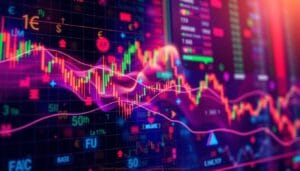לצעיר בשוק ה-פורקס יכול להיות מרגש אך גורם להרגשה של עומס. כחדשן, הבנת המורכבויות שלו היא חיונית. מאמר זה מטרתו לספק לך עקרונות בסיסיים של פורקס. הם מטרתם לנחות אותך דרך מורכבויות השוק. להבנת מושגים בסיסיים ואסטרטגיות מסחר עוזר להימנע משגיאות נפוצות. שמירה על רצון ללמוד היא חיונית. ככל שתהיה מושכל יותר, כך יהיה חלק יותר חלק במסע הפורקס שלך. בואו נתחיל בדרך להפוך למיומן במסחר ב-פורקס.
מסקנות מרכזיות
- להבין את היסודות של מסחר בפורקס לפני שנכנסים לתהליך.
- לבחור פלטפורמת מסחר אמינה המתאימה לצרכים שלך.
- להשתמש בחשבון הדמו לתרגל אסטרטגיות מסחר.
- לפתח תוכנית מסחר יציבה המתמקדת ב-ניהול סיכון.
- ללמוד גם ניתוח טכני וניתוח יסודי כדי לקבל החלטות מושכלות.
- להישאר מעודכנים עם חדשות השוק וטרנדים כדי לשפר את מיומנויות המסחר שלך.
הבנת היסודות של מסחר בפורקס
למידת היסודות של מסחר בפורקס היא מרכזית עבור כל מי שנכנס לעולם ההחלפת מטבעות. זה על סחר במטבע אחד בעבור מטבע אחר בשוק ה-פורקס הפעיל. שוק זה פתוח חמישה ימים בשבוע, 24 שעות ביממה.
מהו מסחר בפורקס?
מסחר בפורקס הוא על ניחוש בערך המטבעות זה נגד זה. זה משתלב ב-זוגות מטבעות, כמו קניית אחד בעוד שמוכרים אחד אחר. לדוגמה, כאשר אנו מדברים על EUR/USD או GBP/JPY, אנו מתייחסים לזוגות אלה. סוחרים קמעונאיים, בנקים גדולים וחברות משתמשים ב-שוק הפורקס כדי לנהל סיכוני מטבע.
מבנה שוק הפורקס
מבנה שוק הפורקס מורכב, עם שחקנים שונים מעורבים. אלה כוללים:
- סוכנים: הם עוזרים לסוחרים לגשת לשוק ולבצע עסקאות.
- סוחרים: הם מוסיפים נזילות ומייצרים יציבות בשוק.
- בנקים: בנקים גדולים מבצעים עסקאות גדולות שמכוונות את מגמות השוק.
השילוב של משתתפים זה יוצר שוק גמיש ומתפשר. כאן, ערכי מטבע משתנים בהתאם לביקוש ולספק. המסחר התמד שלהם מספק נזילות, מה שהופך קל לסוחבים להיכנס או לצאת מהשוק במהירות.
טיפים חיוניים למסחר בפורקס עבור מתחילים
התחלת מסע המסחר בפורקס כוללת למידת שלבים חשובים. לדעת כיצד לבחור את פלטפורמות המסחר הנכונות ולהשתמש ב-חשבונות דמו חיוני. השלבים הללו עוזרים ללמוד בקלות ומסייעים למתחילים לשפר את מיומנויות המסחר שלהם.
בחירת הפלטפורמה הנכונה למסחר
בחירת פלטפורמת מסחר טובה יכולה לשנות את חוויית המסחר שלך. פלטפורמות כמו MetaTrader 4, MetaTrader 5 ו-TradingView מציעות תכונות שונות. חשוב לשקול את הנקודות החשובות הללו בעת מחפש פלטפורמה:
- ממשק משתמש: פלטפורמה שקלה לשימוש היא מרכזית.
- כלים זמינים: פלטפורמות צריכות לכלול כלים טובים, כמו תרשימים ואינדיקטורים.
- תמיכה ללקוחות: תמיכה טובה עוזרת לפתור בעיות ולענות על שאלות.
| פלטפורמה | ממשק משתמש | כלים למסחר בפורקס | תמיכה לקוחות |
|---|---|---|---|
| MetaTrader 4 | קל לנווט בו | כלים חזותיים חזקים | צ'אט חי 24/5 |
| MetaTrader 5 | עיצוב מודרני | ניתוח טכני מתקדם | תמיכה באימייל ובטלפון |
| TradingView | ידידותי למשתמש | תכונות קהילתיות | פורומים קהילתיים ומדריכים |
הגדרת חשבון הדגמה
עבור מתחילים, הגדרת חשבונות הדגמה היא צעד מרכזי. זה מאפשר לסוחרים לנסות תנאי שוק אמיתיים בלי סיכוני כסף אמיתי. שימוש בחשבון הדגמה גם עוזר בלמידת כיצד לבצע עסקאות, לנתח את השוק ולהתרגל לפלטפורמות שונות.
חשבונות הדגמה מספקים טיפים נהדרים לסוחרים חדשים. הם מאפשרים אימון של אסטרטגיות ושיפור מיומנויות. זה בונה ביטחון לפני התחלת מסחר חי. זה גם עוזר בבחירות מסחר טובות יותר.

פיתוח אסטרטגיית מסחר
יצירת אסטרטגיית מסחר בפורקס יציבה היא מרכזית להבנת השוק. אסטרטגיית מסחר מתוכננת היטב יוצרת את היסוד להצלחה. זה גם עוזר בניהול הסיכונים כדי למנוע אובדן גדול. הכרת הרכיבים המרכזיים הללו בונה מערכת חזקה
דיסציפלינת מסחר. זה מוביל לצמיחה יציבה.
חשיבותה של תוכנית מסחר
תוכנית מסחר מכילה חלקים קריטיים שעוזרים לסוחרים לקבל החלטות טובות. היא כוללת:
- כללי כניסה ויציאה: כללים ברורים למתי להתחיל ולסיים עסקאות כדי להגדיל רווחים.
- יחסי סיכון/תמורה: שקילת רווחים אפשריים נגד הסיכונים של עסקה.
- הערכות ביצועים: בדיקה באופן קבוע של עסקאות קודמות כדי לשפר את האסטרטגיות העתידיות.
קיום כללים אלה הופך את המסחר ליותר עקבי ומסודר. זה חשוב להצלחה במסחר בפורקס לאורך זמן.
טכניקות ניהול סיכון
ניהול סיכון טוב הוא חיוני לשמירה על הכסף שלך בטוח ולהישאר בשוק הפורקס לזמן רב יותר. כמה שיטות מרכזיות כוללות:
| טכניקה | תיאור |
|---|---|
| הזמנות Stop-Loss | דרך לסיים עסקה באופן אוטומטי אם ההפסדים מגיעים לנקודה מסוימת, עוזרת להגביל את ההפסדים העתידיים. |
| גודל פוזיציה | לחשב כמה להשקיע בעסקה, בהתבסס על גודל החשבון שלך ועל הסיכון שאתה יכול לקחת. |
| אסטרטגיות דיוורסיפיקציה | לשים השקעות במקומות שונים כדי להוריד את הסיכון. |
שימוש באסטרטגיות אלו עוזר לשמור על דיסציפלינה במסחר. זה מאפשר לסוחרים להתמודד בביטחון עם תנאי שוק שונים.

ניתוח טכני וניתוח יסודי
הבנת שוק הפורקס דורשת התבוננות מרזה. סוחרים משתמשים בניתוח טכני ו-ניתוח יסודי כדי לעשות זאת. כל שיטה עוזרת להבין איך השוק מתנהג ומסייעת בפיתוח אסטרטגיות.
מבוא לניתוח טכני
ניתוח טכני משלב ביקורת של מחירים קודמים כדי לחזות מגמות עתידיות. זה משתמש בתרשימים, ממוצעים נעים ואוסילטורים. על ידי ניתוח תנועות מחיר קודמות, סוחרים יכולים לחזות מה עשוי לקרות ללא צורך בהתבוננות ביסודות כלכליים.
הבנת ניתוח יסודי
מצד שני,
ניתוח בסיסי חוקר את בריאות הכלכלה. זה מביט ב-מדדים כלכליים, ריבית, ואירועים גלובליים שמשפיעים על ערכי מטבע. סוחרים משתמשים בזה כדי להבין את התמונה הגדולה ולמצוא הזדמנויות מסחר בהתבסס על מגמות כלכליות.
שימוש במדדים כלכליים במסחר
שילוב של ניתוח טכני וניתוח בסיסי יוצר תוכניות חזקות יותר. לשמור עין על מדדים כלכליים מסייע לסוחרים לסנכרן את הניתוח שלהם עם התנאים הכלכליים הנוכחיים. אלמנטים כמו צמיחת התמ"ג, שעתוק האבטלה, וביטחון הצרכן נותנים הקשר ל-ניתוח טכני. בכך, סוחרים יכולים לקבל החלטות מושכלות יותר.

| סוג ניתוח | מוקד ראשי | כלים בשימוש | טווח זמן |
|---|---|---|---|
| ניתוח טכני | תבניות מחיר וטרנדים | תרשימים, מחוונים, אוסילטורים | קצר לתיקון |
| ניתוח יסודי | גורמים כלכליים ואירועים | דוחות כלכליים, הוצאת חדשות | בינוני לארוך טווח |
מסקנה
סקירת מסחר הפורקס הזו הראתה לנו את היסודות החשובים לכל סוחר חדש. לדעת כיצד שוק הפורקס פועל חיוני. זה עוזר לך לקבל החלטות מסחר חכמות. להתחלה עם פלטפורמת מסחר נכונה וחשבון הדגמה הוא צעד חשוב. זה מאפשר למתחילים ללמוד כיצד להתמודד עם השינויים בשוק.
סכמנו גם על טיפי מסחר. יש לכם להכיל תכנית מסחר יציבה ו ניהול סיכונים הוא קריטי להצלחה ארוכת טווח. לדעת כיצד לנתח את השוק בדרכים טכניות ויסודיות היא גם חשוב. הניתוחים האלה עוזרים לסוחרים לחזות ולהבין שינויים בשוק.
להתחלת מסע הפורקס שלך נדרשת סבלנות ואהבה ללמידה. שוק הפורקס משתנה לעיתים תכף, לכן חשוב לעקוב אחרי מגמות חדשות וכלים. מדריך זה מטרתו לשרוד אותך להשתמש במה שלמדת ולעצור ללמוד. עם עבודה קשה ותרגול, תוכל לשלט במסחר בפורקס. ניצחון באתגרים יכול להוביל להזדמנויות גדולות להצלחה.










